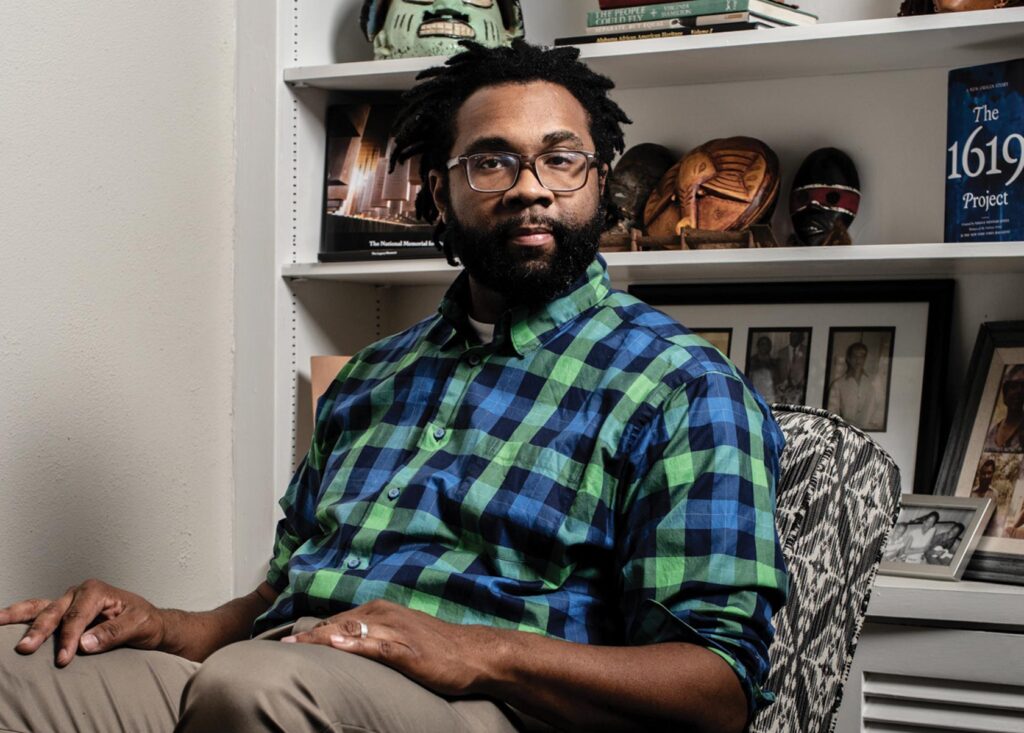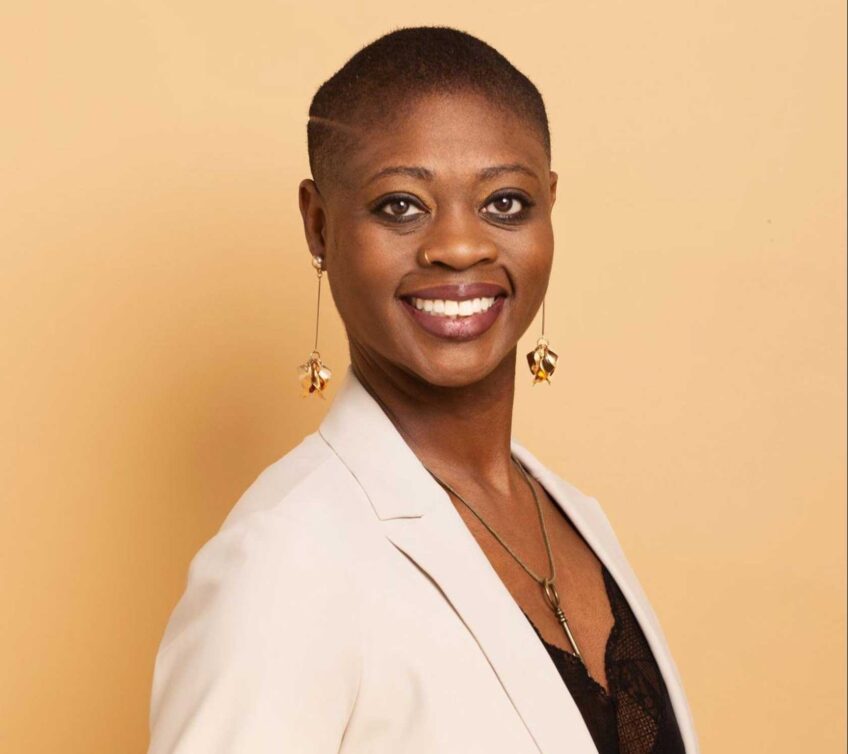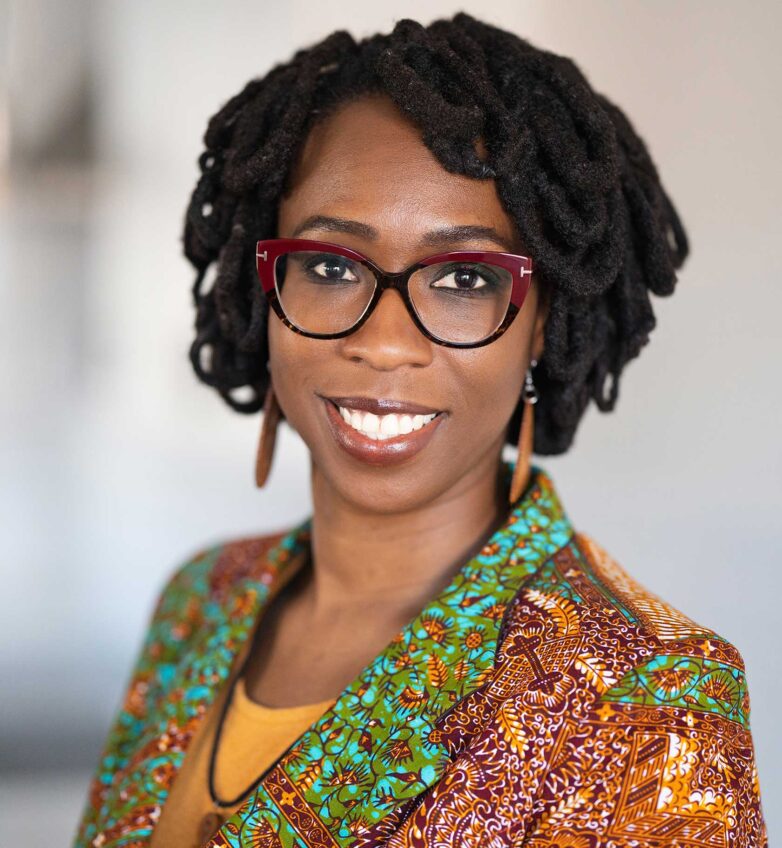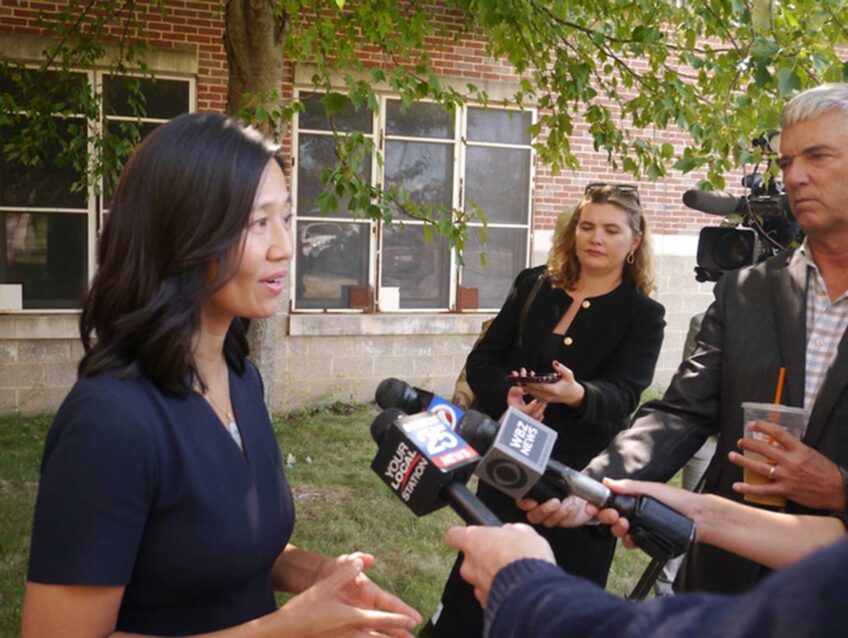Plaintiff in Ala. redistricting case brings voting rights message to Boston
Supreme Court verdict could spell trouble for U.S. voters

The lead plaintiff in an Alabama voting rights case before the United States Supreme Court visited Boston last week to raise funds and cultivate allies for a statewide coalition of activists working to promote Black civic engagement in the southern state.
Evan Milligan, executive director of Alabama Forward in Montgomery, and three other state residents filed a lawsuit in 2021 challenging the Republican-dominated legislature’s redistricting of the state’s congressional districts. The new map packed Black voters into one existing Black-majority district instead of adding a second, an omission that the suit argues violates the Voting Rights Act.
A panel of three federal judges agreed. Black residents make up 27% of the population in the state, which has seven congressional districts.

Evan Milligan (far right) speaks during the “friendraiser” at Pucker Gallery along with (from left) Kenyona Blocker, Felton Thompson and Amon Robinson. PHOTO: COURTESY PUCKER GALLERY
The state has appealed the ruling to the U.S. Supreme Court, maintaining that to draw a second Black district deliberately would amount to racial discrimination. The high court heard Merrill v. Milligan in October and is expected to rule this spring on the case, which could overturn a key section of the Voting Rights Act.
“I expect the justices to uphold the Constitution,” Milligan said, drawing a mix of chuckles and applause from his audience in the Back Bay, “and if they don’t, we have options.”
The one option Milligan cited would be a long-term goal.
“We need to have an amendment to the U.S. Constitution that establishes a right to vote and a right to have that vote counted — before we have a civil war,” he warned. “We don’t need to wait until we have a civil war like we did with the Thirteenth, Fourteenth and Fifteenth amendments, which was the last batch of amendments that come from a similar place.”
Milligan, a graduate of New York University Law School, predicted it would take 20 years to build a movement to make passage of such a voting rights amendment competitive. To be added to the Constitution, it would need a two-thirds vote in both chambers of Congress and ratification by 38 states.
“Maybe we get the amendment, maybe we won’t,” he said. “There’s a lot of hope in building a movement that has those goals in mind and also one that is committed to legislative goals.”
Milligan was speaking at his last public event in the city on May 4 at the Pucker Gallery, surrounded by colorful paintings upstairs in a Newbury Street brownstone. Bernie and Sue Pucker, the gallery’s owners, hosted the “friendraiser” after meeting Milligan last year on a civil rights tour of Alabama guided by Marc Skvirsky, a former program director of Facing History & Ourselves in Boston. Others among the 13 who went on the tour were present.
Skvirsky, who interviewed Milligan in the art gallery, met him eight years ago on one of many trips to Alabama. “I was inspired [by] people that are doing just incredible work,” Skvirsky said.
The event was reminiscent of visits civil rights leaders like Martin Luther King Jr. made to the city in the 1950s and 1960s to speak about their cause and raise funds to support it. Milligan, who at 42 is older than King lived to be, appeared before an audience of three dozen people, mostly white, who were present to show their commitment to racial equality. The mood in the room was upbeat and friendly.
The organization that Milligan directs, Alabama Forward, is a state coalition whose members provide advocacy and services to residents, including voter registration. The coalition was founded in 2020 and has rapidly expanded to 31 member groups.
Like the civil rights movement, Alabama Forward uses music to build bridges to poor, ill-educated state residents, but the tunes are original and have been updated in style. Milligan and three of his cohorts, one a keyboardist trained at the Berklee School of Music, performed three songs that fused singing activist lyrics and rapping. One tune was about the redistricting case, “Just one…Two!”
Skvirsky asked Milligan why his organization uses music.
“Because we don’t have the votes in Alabama. We have to have something that inspires people” who have grown accustomed to being discounted, he replied. “Being considered (of) inferior status because of a perception of (limited) intellectual capacity, I think, preconditions people to give up on some of the very things that folk in the freedom and democracy community would want them to want more of.”
Later, he added: “It’s hard to build a social movement, a change movement, on an inferiority complex.”
Nonpartisan Alabama Forward often finds itself in policy conflicts with the Republican supermajorities in the state legislature, where a pending bill would make it a crime to help voters request absentee ballots or fill out one. If the bill passes, Milligan and other Alabama activists are debating whether to continue providing that kind of help to nursing home residents and prison inmates, for example, as a protest.
“We have to invest in red states. We can’t abandon those people. There are Democrats there,” said Jo Frances Meyer, director of Puddingstone Consulting, who met Milligan last year on the civil rights tour.
When Skvirsky asked Milligan why people in the Boston area should care about Alabama, he said: “It’s not about saving us. It’s about saving you.”
The voting rights activist explained that “some of the highest-ranking officials” in Alabama “brazenly associate with far-right nationalist groups, Christian nationalist groups” that are trying to push the entire country towards what Milligan described as “an authoritarian, theocratic government.”




